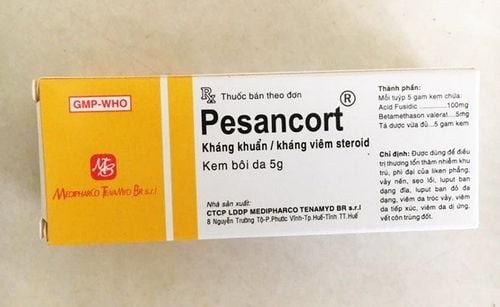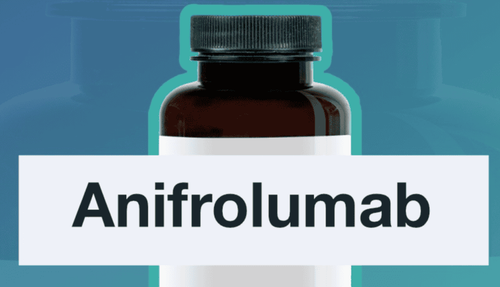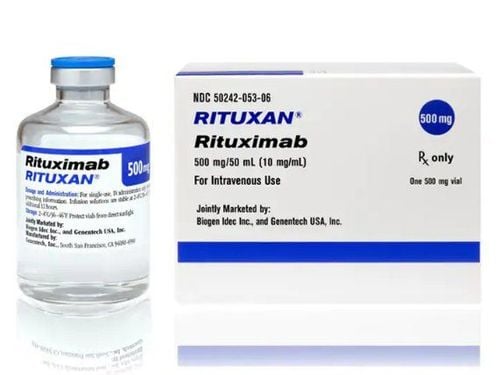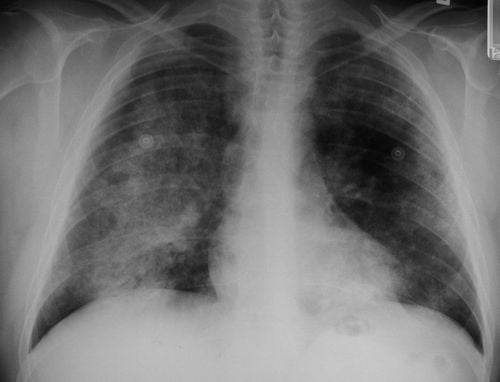This is an automatically translated article.
The immune system in the human body has the function of defending against the invasion of bacteria and diseases. However, in some people the immune system is dysfunctional, so it turns to attack the body's own cells, thereby giving rise to diseases collectively known as autoimmune diseases. Autoimmune disease is a dangerous disease because it cannot be completely cured and causes many serious complications.1. What is an autoimmune disease?
Autoimmune disease is a disease that occurs when the immune system loses the ability to distinguish foreign antigens from self-antigens. Autoantigens are components of the body that, for some reason, become foreign, the body's autoantibodies against these autoantigens cause autoimmune disease to occur.
The disease is common in young or elderly people (usually from 20 to 40 years old). Children and the elderly are less common, women more often than men.
The disease progresses in stages, getting worse (hence the name self-sustaining disease) and the progression is often complicated, ranging from acute, fulminant to mild, persistent.
Autoimmune diseases are inherited and often run in families. An autoimmune disease can damage multiple organs at the same time.
2. Causes of autoimmune disease
Modern medicine has identified a number of causes of autoimmune diseases including:
Environmental pollution: Autoimmune diseases, especially lupus erythematosus, are more serious when the living environment is polluted. . Chemicals such as mercury, pesticides, hair dyes, plastic bags... can directly damage the immune system. In this case, the autoimmune disease occurs because the body's tissues are so damaged and altered that the immune system "doesn't recognize it". Infection: This is also the cause of some autoimmune diseases such as rheumatic fever, spondylitis.... These autoimmune diseases can occur due to the body's cells similar to bacteria, So, instead of killing germs, the immune system attacks the body's own cells. Disruption of gut bacteria: There are billions of bacteria living in the gut that play a role in regulating the immune system. However, due to the overuse of antibiotics and the indiscriminate use of oral contraceptives, an imbalance of the intestinal microflora leads to autoimmune diseases and immune disorders. Vitamin D deficiency: Vitamin D plays a very important role in the functioning of the immune system, it supports the immune system against cancer, preventing the binding of components against the immune system.

Vitamin D có vai trò rất quan trọng đối với hoạt động của hệ miễn dịch
3. Common autoimmune diseases
Colloidal diseases:
Autoimmune lupus erythematosus: Due to autoantibodies against antigens such as DNA, Ro, Sm. Usually occurs in female, young (90%). Injury to many organs such as: Skin: butterfly-shaped rash on the face, ulcers of the oral mucosa, hair loss. Musculoskeletal: inflammation, myalgia, polyarthritis. Kidney: causes nephrotic syndrome. Nerve: damage to many places of the nerve. Cardiovascular: dry pericarditis, fluid, spasm, myocarditis, endocarditis, myocardial infarction due to coronary artery disease, capillary thrombosis. Lungs: pneumonia with atelectasis, pulmonary fibrosis, pleurisy. Hematology: coagulopathy, anemia, hemolysis. Digestion: causing diarrhea, intestinal perforation, intestinal pseudo-obstruction, acute pancreatitis, increased liver enzymes. Eyes: retinal vasculitis causing blindness, conjunctivitis, optic neuritis, dry eyes. Rheumatoid arthritis: Due to autoantibodies against HLA DR4, DR1, the trigger may be Epstein Barr virus. Sjogren's syndrome: Due to autoantibodies against epidermal cells of the salivary ducts, autoantibodies against the causative agent, causes dry syndrome (eyes, saliva, nose). Endocrine diseases:
Hashimoto's chronic thyroiditis: The disease is caused by anti-Thyroglobulin, anti-Thyroperoxidase autoantibodies, microplatelets. Usually occurs in females, thyroid may or may not be enlarged, lymphoid infiltrates. In the early stages, there may be transient hyperthyroidism, then hypothyroidism, progressing slowly, possibly with other autoimmune diseases. Graves' disease is caused by autoantibodies to TSI, TBII, and TGI. Diabetes mellitus (type 1) due to autoantibodies against Langerhans islands, anti-glutamic acid decarboxylase, anti-beta cells. Other autoimmune endocrine diseases: Primary Addison's: anti-adrenal cortex autoantibodies. Primary hypoparathyroidism: autoantibodies against primary cells of the parathyroid gland. Autoimmune primary azoospermia: anti-sperm autoantibodies. Hematology:
Biermer pernicious anemia: due to anti-parietal cell autoantibodies, anti-FI autoantibodies and anti-FI autoantibodies + Vitamin B12 causes anemia, atrophy of the tongue and stomach mucosa with lymphoid infiltrate . Autoimmune hemolytic anemia caused by autoantibodies against natural red blood cell surface antigens, manifested as acute or chronic hemolysis, occurs at any age. Acute, usually occurs in children after a number of acute diseases such as pneumonia caused by Mycoplasma, Eaton, mumps, shingles, chickenpox, influenza, viral hepatitis... Chronic, usually occurs in adults after chronic diseases such as chronic lymphocytic leukemia, systemic lupus erythematosus, Hodgkin's disease, myasthenia gravis, hemorrhagic colitis, Basedow, cirrhosis... Autoimmune thrombocytopenia: Due to antiplatelet autoantibodies, the disease is less common, cause chronic thrombocytopenic purpura alone or in combination with some chronic diseases such as chronic lymphocytic leukemia, hodgkin's, non-hodgkin's lymphoma, thymoma, hemolytic anemia, systemic lymphocytic erythema... due to autoantibodies against bone marrow germ cells. Leukopenia due to anti-leukocyte autoantibodies.
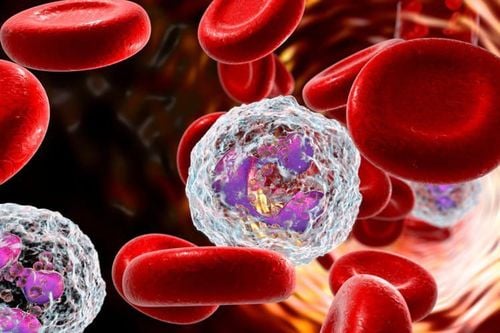
Giảm bạch cầu do tự kháng thể chống bạch cầu
Neurological:
Severe myasthenia gravis. Multiple sclerosis due to anti-myelin autoantibodies usually occurs in young people (15-40 years old) with diverse neurological lesions, sensory disturbances, cerebellar, ocular lesions, spinal cord lesions skeletal, with mental abnormalities. The disease progressed gradually. Guillain Barré syndrome, polyneuritis, autoantibodies unknown, peripheral paralysis of 2 lower extremities, cerebrospinal fluid: cell protein dissociation. Digestive and hepatobiliary:
Primary biliary cirrhosis due to anti-Mitochondrie autoantibodies. Chronic hepatitis is caused by autoantibodies against smooth muscle, autoantibodies against lipoproteins of hepatocytes. Coeliakie disease: caused by autoantibodies against Reticuline. Hemorrhagic ulcerative colitis: no autoantibodies found. Crohn's disease causes narrowing of the gastrointestinal tract, especially the colon, clinically and subclinically easily confused with tuberculosis of the colon, no autoantibodies have been found. Kidney:
Some diseases of glomerulonephritis and tubulointerstitial nephritis: due to autoantibodies against antigens and tumor antigens, anti-IgG. Goodpasture syndrome: Due to autoantibodies against the glomerular basement membrane. Lungs:
Goodpasture syndrome : Due to autoantibodies against the alveolar basement membrane. Idiopathic fibrocystic alveolitis. Wegener's granulomatosis, the latter two diseases of unknown autoantibodies. Skin:
True Pemphigus: Anti-epidermal autoantibodies. Pemphigus botü: autoantibodies against the basal membrane of the epidermis. Vitiligo anti-melanocyte autoantibodies. Vasculitis: Such as temporal arteritis, Wegener's granulomatosis, Churg Strauss disease, periarteritis nodule. These diseases have no known autoantibodies.
4. Manifestations of autoimmune disease
Autoimmune diseases can affect many different parts of the body and cause complications, so that is one of the reasons why the disease is difficult to diagnose. According to the diagnosis, women are more easily diagnosed than men. Some manifestations of autoimmune disease include:
Fever persists despite taking antipyretic drugs and continuously recurs. Symptoms of fatigue often feel tired, lethargic, inattentive, demoralized. If you find this condition, you should see a doctor early to find out the cause for early treatment. Itchy skin, hives, rash: Many people easily mistake it for an allergy, but when the body's immune system is weakened, it causes itchy skin, or hives or rashes. Unusual weight gain or loss: If you feel that your body weight suddenly increases or decreases, it may be due to a disorder in the body's metabolism, an altered immune system. Swollen glands in the joints and throat because the immune system creates antibodies that "destroy" the tissues in the organs. Changes in bowel movements and metabolism food allergies or digestive problems make you more likely to have food allergies or cause constipation or diarrhea.
5. How to prevent autoimmune disease
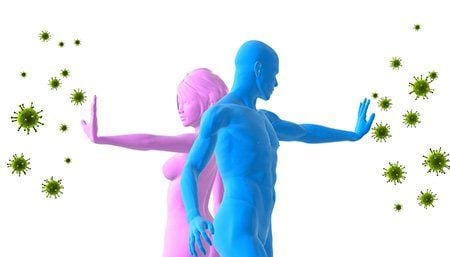
Làm cách nào để phòng tránh bệnh tự miễn?
To prevent autoimmune diseases and protect the immune system, it is necessary to maintain a suitable diet, get enough rest and limit smoking. Don't let yourself be overweight or obese because being fat can also increase your risk of certain autoimmune diseases, like rheumatoid arthritis or psoriatic arthritis. It is necessary to maintain regular health check-ups 1-2 times a year to detect dangerous diseases early, including diseases related to the immune system. At the same time, you also need to regularly exercise to choose the right sport to practice regularly every day. When it is discovered that you have autoimmune disease, you should go to the doctor immediately for advice on appropriate treatment methods, do not arbitrarily use drugs of unknown origin, which can make the disease more serious and dangerous. to life. Currently, although many new drugs and techniques have been developed to treat autoimmune diseases, they can only treat the symptoms of the disease but cannot completely cure it. No one can protect themselves the best but you, so everyone needs to learn and raise the awareness of protecting the body's immune system with simple everyday methods.
Please dial HOTLINE for more information or register for an appointment HERE. Download MyVinmec app to make appointments faster and to manage your bookings easily.




